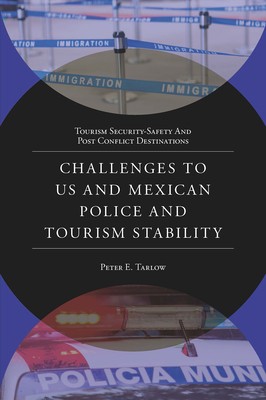
- We will send in 10–14 business days.
- Author: Peter E Tarlow
- Publisher: Emerald Publishing Limited
- ISBN-10: 1803824069
- ISBN-13: 9781803824062
- Format: 15.2 x 22.9 x 1.8 cm, hardcover
- Language: English
- SAVE -10% with code: EXTRA
Challenges to Us and Mexican Police and Tourism Stability (e-book) (used book) | bookbook.eu
Reviews
Description
In Challenges to US and Mexican Police and Tourism Stability, author Peter Tarlow examines the US-Mexico border crisis and its impact on tourism, along with tourism security in both the United States and Mexico. He also examines the impact of police corruption and cartels on the tourism industry. Presenting detailed case studies of the U.S. cities of Chicago, New York, San Francisco, and Washington D.C, the collection concludes with comparisons on the issues facing tourism policing in the US and Mexico, exploring the dangers, hopes and recommendations for the future.
The way a state's police force operates generates a range of complex and interconnected issues, including law enforcement's role in tourism. Recent debates have arisen around the media and law enforcement such as the incidents leading to the George Floyd protests and the Defund-the-Police movement. Challenges to US and Mexican Police and Tourism Stability examines the impacts that historical, political, and social campaigns targeting police practices have had on law enforcement in general and on the tourism industry in particular, specifically focusing on recent developments in both the USA and Mexico.
The Tourism Security-Safety and Post Conflict Destinations series provides an insightful guide for policy makers, specialists and social scientists interested in the future of tourism in a society where uncertainness, anxiety and fear prevail.
EXTRA 10 % discount with code: EXTRA
The promotion ends in 19d.18:15:07
The discount code is valid when purchasing from 10 €. Discounts do not stack.
- Author: Peter E Tarlow
- Publisher: Emerald Publishing Limited
- ISBN-10: 1803824069
- ISBN-13: 9781803824062
- Format: 15.2 x 22.9 x 1.8 cm, hardcover
- Language: English English
In Challenges to US and Mexican Police and Tourism Stability, author Peter Tarlow examines the US-Mexico border crisis and its impact on tourism, along with tourism security in both the United States and Mexico. He also examines the impact of police corruption and cartels on the tourism industry. Presenting detailed case studies of the U.S. cities of Chicago, New York, San Francisco, and Washington D.C, the collection concludes with comparisons on the issues facing tourism policing in the US and Mexico, exploring the dangers, hopes and recommendations for the future.
The way a state's police force operates generates a range of complex and interconnected issues, including law enforcement's role in tourism. Recent debates have arisen around the media and law enforcement such as the incidents leading to the George Floyd protests and the Defund-the-Police movement. Challenges to US and Mexican Police and Tourism Stability examines the impacts that historical, political, and social campaigns targeting police practices have had on law enforcement in general and on the tourism industry in particular, specifically focusing on recent developments in both the USA and Mexico.
The Tourism Security-Safety and Post Conflict Destinations series provides an insightful guide for policy makers, specialists and social scientists interested in the future of tourism in a society where uncertainness, anxiety and fear prevail.


Reviews